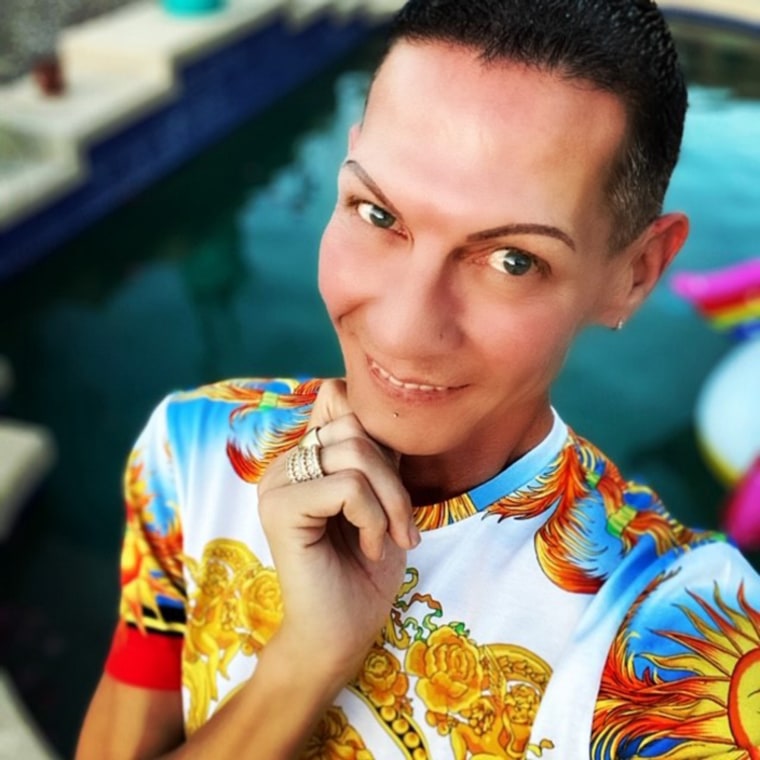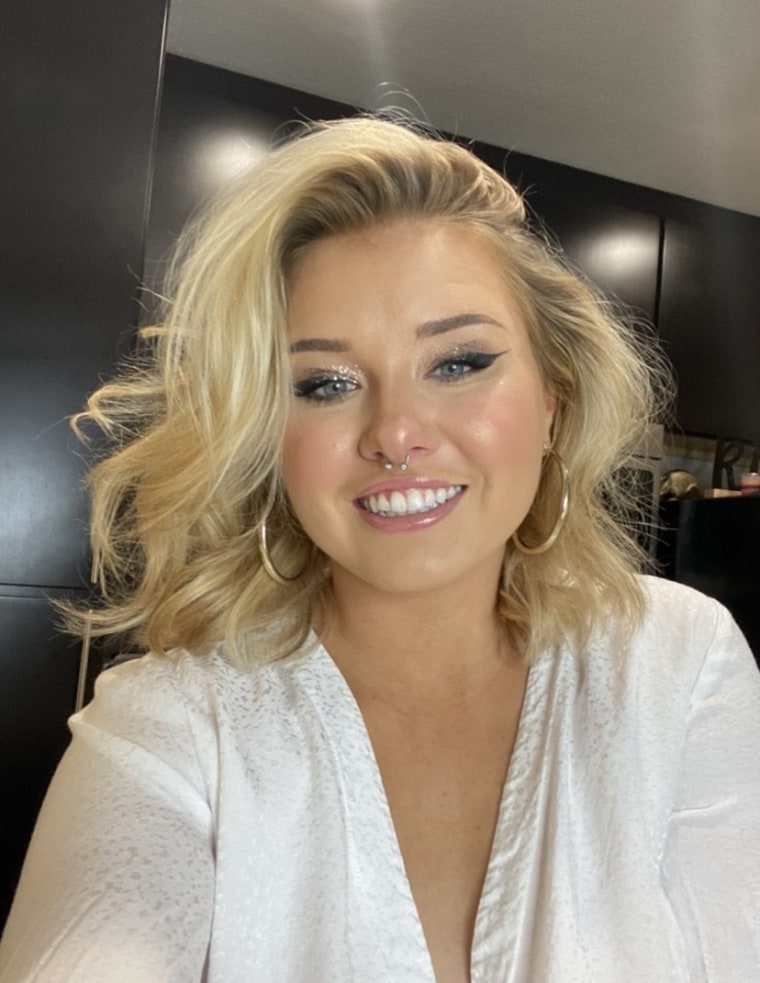Closeted Hasidic Trans Woman Inches Closer to Her ‘Feminine Dream’
Rivky strolled through the Zara store in Manhattan’s fashionable SoHo neighborhood, one eye examining the racks of skirts and blouses and the other looking out for anyone she might know. She was looking for something that would fit her broad frame. Rivky made her way to the women’s dressing room line, dresses and skirts piled on her forearms. The female attendant looked confused and then chuckled. Why was this male-presenting person — wearing traditional Hasidic Jewish men’s attire — walking into the fitting room with women’s clothing?
Rivky, 41, is not your typical gender-conforming religious observer. Her white dress shirt, black vest and black slacks — the daily dress code for Hasidic men — serve as culturally acceptable covers for the bra and women’s underwear she frequently wears underneath. She feels her best when dressed in women’s attire, and at home she regularly strips down to just a bra, panties and nylon tights when she knows her wife will not be back for hours.
“It makes me feel like I want to dance for joy,” said Rivky, who asked that her full name not be published because she is not out to friends and family about her gender identity.
“If you take a magnifying glass and look into my heart, you will see 100 percent I am a girl.”
RIVKY
Rivky identifies as transgender but deeply buries these emotions and feelings away from her ultra-Orthodox community in Borough Park, Brooklyn. She fears that if she were to come out of the proverbial closet, she would face social expulsion or, worse, abandonment by her wife and four children. While there is no set Hasidic policy regarding those who come out as transgender, the community’s strict code of living does not condone even the slightest deviation from the Hasidic norm.
Neither biblical nor rabbinical literature points to changing one’s sex, but the Torah does discuss cross-dressing, said Rabbi Ethan Witkovsky of Park Avenue Synagogue, a prominent Conservative congregation in New York.
Deuteronomy 22:5 reads, “The woman shall not wear that which pertaineth unto a man, neither shall a man put on a woman’s garment: for all that do so are abomination unto the Lord thy God.”
Witkovsky said some rabbinical teachings might support the literal translation of this verse, while others would interpret it otherwise.
Related
Jennifer Lopez shares video about transgender ‘nibling,’ Brendon
From a young age, Rivky was in tune with her womanhood, but always in secret. As a child, she mirrored her sisters and female cousins, and she dressed like a girl when she had the chance. When her mother was away, Rivky, as young as 6 years old, would sneak into dresser drawers and try on her mother’s undergarments. They were large on Rivky’s child-size body but nonetheless “amazing,” she recalled with a smile.
When she grew older, Rivky ventured to women’s stores outside her community and glanced around the racks, wistfully. She was ashamed to admit her presence and found herself telling salespeople that she was shopping for her mother or sister. That prevented her from entering fitting rooms to try on clothes, denying her the satisfaction she craved.
“I should’ve been born a girl,” she said.
Despite temptations, Rivky kept her desires clandestine, believing they were sinful thoughts that needed to be purged.
“I would pray to God, ‘Take this away from me,'” she recalled.
But the more she pushed her womanhood away, the stronger her feminine wishes would return. Rivky continued to fight them off and kept to tradition when the Hasidic community arranged her marriage at 18. More than two decades and four children later, concealing her true identity left Rivky feeling incomplete. Only in the past 10 years has she realized that the only way to make peace with herself is to embrace those thoughts. Her urge to be the woman she has always wanted to be — after decades of hiding — grew stronger and stronger.
“I wanted to take off my beard,” she said. “I wanted to grow my hair.”
Rivky’s face glowed under tangled facial hairs when she discussed how she wants to take hormones some day. She also dreams of growing her hair long and styling it. She does, however, already shave her legs and chest hair from time to time, she confessed.
Related
Trans icon Marsha P. Johnson to be honored with statue in N.J. hometown
In small and subtle ways, Rivky increasingly started to express her gender identity, while keeping her friends and relatives in the dark. Her wife, however, had her suspicions and conveyed her disapproval. The couple have not discussed Rivky’s identity as a transgender lesbian, but Rivky said she knows that if she were to come out, she would lose her wife and children.
While coming out to those within her religious community is still a bridge too far for Rivky, she has taken steps to open up to those outside her Hasidic circle.
On a recent Sunday, Rivky attended a monthly feminist gathering in Brooklyn called Sacred Space, which celebrates and empowers women of all and no religious backgrounds. Women of various ages flashed smiles, exchanged hugs and gathered in a large circle around pastel furniture at the meeting room in the borough’s trendy DUMBO neighborhood. Attendees began introducing themselves, and Rivky, dressed in slacks and a dress shirt with her long curly sidelocks falling from her balding head, spoke up.
“If you take a magnifying glass and look into my heart, you will see 100 percent I am a girl,” Rivky announced in a Yiddish accent. She attended the event to see the co-host, Abby Stein, an openly transgender woman who was once an ultra-Orthodox rabbi. Rivky listened to Stein attentively, admiring her courage and openness, and then ducked out of the meeting early, as confidentiality was a concern.
Recommended
OUT NEWSFor Beirut’s gay community, chemical blast shattered a safe space
OUT NEWS‘Cheer’ star La’Darius Marshall is ‘safe’ after alarming post
Rivky yearns to assimilate into a larger society that extends beyond Brooklyn’s ultra-Orthodox community, and without blowing her cover, she relies on Facebook as an outlet. Hasidic Jews typically do not use social media, but Rivky’s account is disguised, and it is strictly used for expressing her womanhood. Her Facebook cover image is of a rainbow flag with the words “love is love,” and her profile photo is of a polished woman’s hand holding a red rose. Her tag line reads, “A transgender girl who appreciates seeing a smile on her friends lips when they are painted hot red!”
An estimated 1.4 million adults identify as transgender in the United States, according to the Williams Institute at UCLA School of Law, although it is unknown how many trans Americans, like Rivky, are not open about their gender identities. For those who do come out, living openly is not without its challenges: According to the Human Rights Campaign, the country’s largest LGBTQ advocacy group, transgender people often face discrimination in housing, employment and health care, among other hurdles.

Stein, 28, is no stranger to the challenges of both the proverbial closet and coming out as transgender in the Hasidic community. A former rabbi, Stein said she struggled with her gender identity since she was at least 5 years old, recalling anger toward her parents at the time for not letting her wear dresses and telling her mother that the genitalia she was born with “doesn’t belong there.”
Stein was born into a large family of 12 children, and she socialized with no one outside her close-knit Hasidic circle in Brooklyn growing up. She divorced her wife, pursued a secular education and then came out as transgender in 2015. Stein was ostracized by her religious community, and her ex-wife severed ties, as well, because Hasidic leaders forbade their remaining in contact. She does, however, get to visit with her son from time to time. Now, five years after having left the community, she still savors the freedom fueled by that difficult decision.
“Even sometimes just waking up in the morning and walking in the streets you can be yourself,” she said. “Being yourself every day is really powerful. I can’t overstate that enough.”
She finds value in the opportunity to meet people from all walks of life rather than be confined to one group that shares the same religious and cultural values.
“I could never form strong friendships before I came out,” she said, adding that now, after having traveled to six continents and becoming friends with diverse groups of people, that aspect of her life is thriving. Over the past few years, Stein has become a global LGBTQ rights activist and has given lectures in more than 20 countries, hoping to inspire courage, resilience and inclusion. Her autobiography, “Becoming Eve: My Journey from Ultra-Orthodox Rabbi to Transgender Woman,” was released in November.
But while Stein has found beauty and inspiration in her expanded world, the loneliness that comes from the loss of her Hasidic friends and family still creeps in from time to time. Stein said that for years after she was shunned by her religious community, she would call her mother every Friday, even though her mother would avoid answering the phone or answer and immediately hang up when she realized Stein was on the other end of the line. Stein called less frequently, reaching out only on holidays, and eventually she stopped calling altogether.
“Being yourself every day is really powerful. I can’t overstate that enough.”
ABBY STEIN
The fear of alienation and losing her family is what kept Rivky on guard during her SoHo shopping trip. But despite the uneasiness, the experience was a mini-vacation, because her wife was out of town.
“Just walking into this environment makes me feel womanized, girlish,” she said while walking into Club Monaco.
“I like heels. Something pointy,” she said before settling on a pair of pink pumps at a nearby shoe store. Her size was not available, but that did not stop her from squeezing what she could of her foot into the shoe and admiring the dainty look in the mirror.
Rivky abides by social distancing rules during the COVID-19 pandemic, but she said the most difficult part has been the lockdown on self-expression. Her family is home more than usual now, which means bras, panties and other expressions of her gender identity are relegated to their own version of quarantine.
There’s “very little time to express my feminine self,” she said dejectedly. A quick trip to the market is her excuse to escape the social construct and at least call her non-Hasidic friends to discuss her frustration. Rivky said her fear of “remaining a man” is greater than her fear of contracting a dangerous virus.
Rivky remains caught between two worlds, and she yearns to one day reconcile her inner gender identity with the person she presents outwardly. On some days, she feels that her coming out is closer, but for now, she continues to sneak out for short shopping trips and to message people through her secret Facebook account.
“Keeping the FEMININE flame’s burning and it gets stronger and wider,” she recently wrote on Facebook. “I am getting closer to living my feminine dream.”



